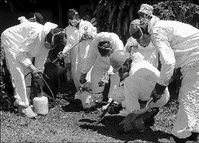
Workers removing asbestos from premises in Old Harbour, St Catherine. - Ian Allen/Photographer
For a very long time, asbestos has been used in close to 4,000 products, including thermal insulation, brake shoe padding, roofing tiles and pipes carrying water and sewage. Asbestos is a family of fibrous substances which fall into two major categories. One type is white and curly and the other type is of either blue or brown straight fibres, the latter being extremely dangerous to health. According to the International Labour Organization, asbestos kills approximately 100,000 people worldwide and many more suffer from asbestos-related illnesses. As a result, all over the world, governments have placed a ban on asbestos and its products, especially the blue or brown type.
Asbestos and your health
Asbestos makes contact with people through inhalation of very small fibres released during the manufacture of asbestos products; contact with materials that have deteriorated or have been carelessly disposed of in the environment and distributed natural sources.
However, not all contact with asbestos leads to health problems. It is inhalation of very small asbestos fibres which, when lodged deep in the lungs or the external lining of the stomach, leads to the hardening of tissue or cancer. Because it is the small fibres that do the damage to the body, it is important to prevent asbestos from breaking down into small particles and to keep airborne dust-bearing asbestos at a minimum. The simplest prevention method is to keep the asbestos wet by applying soapy water on it. Where dust is unavoidable, special filters should be used to clean the air.
devoted to research
UWI researchers, Professor Ishenkumba Kahwa and Dr Howard Reid, have spent several years studying asbestos use, handling and disposal practices in Jamaica. Prof Kahwa, dean of the Faculty of Pure and Applied Sciences, has devoted most of his life to scientific research and education and their application to the improvement of human living conditions. Dr Reid is director of the research-oriented Mona Institute of Applied Sciences which provides professional technical training programmes aimed at supporting key areas of the nation's science and technology initiatives and offers science and technology services to the public.
The UWI researchers have launched several public education campaigns and set up laboratory facilities to detect the presence of asbestos in the air and industrial and household products and installations. They have also removed asbestos and asbestos-containing materials from homes, schools, workplaces and churches, among other places, advocated vigorously for safe and proper packaging and disposal of asbestos in general and assisted the National Environment and Planning Agency in preparing a national policy for managing asbestos pollution. As a result of this effective advocacy for the safe management of asbestos in Jamaica, several entrepreneurs have established successful businesses out of the removal and disposal of asbestos, as well as the sale of safety gear.
Jamaica is a much safer place, thanks to the work of these UWI researchers who have now extended their work to management of hazardous materials in general.